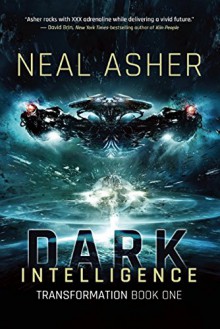

Abandoned at p50.
Yet another space opera tome from Asher, the second in a series. I couldn't remember anything about the first book and realised I just didn't care about any of the far too many protagonists and was bored out of my brains. Asher's Polity setting seems to be mined out of anything original or interesting and there's only so much bad-science pew-pew SF warfare a person can take.

Major spoilers not only for this book but for Asher's Polity books in general, particularly the Agent Cormac series.
I was gallivanting through this, well entertained by the space opera but grumbling to myself about the lack of subtext and rather too obvious fact that the major protagonists were all being manipulated by a superior intelligence to the extent of being near enough puppets, until fairly near the end. It seems like a lot of SF writers do this in one or more books - oh, look! The people you've been tagging along with and got to care about? They may as well have been robots controlled by this AI! It always comes as a let down, not an exciting revelation, at least for me and it usually isn't even all that well disguised a surprise. Certainly not here.
I began to question the lack of subtext towards the end, when the motivations of said AI that's controlling events start becoming clear, though. In earlier Polity books it's made clear that the AIs in charge hold a strict policy of capital punishment for murder and when the in-chargest-of-them-all AI is found to be untrustworthy and itself a murderer it gets it's own punishment. At the time I took the views espoused on criminality and punishment for Asher's own but in this book we have strong themes of atonement for crimes past, redemption and belief in second chances.
Has Asher changed his views? Were the views of the Polity AIs never his in the first place? Was the real point of Agent Cormac's career simply that it should be the same rule for everybody, including the power elite and if they get caught out doing what they condemn with death when others do it, they shouldn't expect any mercy? This and Jupiter War have provided much more food for thought than I would typically expect from Asher. This one also reminded me of what he's best at; alien ecologies and nefarious politics. It also avoids egregious scientific errors sometimes present in his other books. I think if you've never read any other Polity books it's a bad place to start, however, as it takes few prisoners regarding knowledge of previous events.

Space Opera!
Pew! Pew!
Best read by people who don't know any science, like Asher himself.
I often criticise Asher for have lots of Pew! Pew! and no subtext but in this case I think that would be a bit unfair: There's a discussion of what it means to be "free" going on here, which concludes that here is no such thing as complete freedom. In practice, within any society, you only have the rights and freedoms that society allows. On the other hand, the society provides policing and justice. Therefore, the real question is how to organise a society that maximises individual freedom whilst minimising crime. Asher doesn't really offer any good answers to this perennial political poser, instead focusing on the dangers of corruption and bureaucracy. (I get the impression Asher hates the European Union in general and the European Commission in particular.)
Another issue raised is that of human over-population and its impact on the general planetary ecology. The power crazed dictator presented here wants to personally genetically control both human life-span and fertility, an idea branded as morally defective essentially just by association with its deranged progenitor. Again, Asher is not offering any alternatives he'd prefer. The fact is that population control is the most important political and moral issue of our time and nobody is talking about it, let alone taking any action, except the Chinese - and this ties directly back in to the question of personal freedom: should it be an individual's choice whether or not to have children? Should the State forcibly limit the number of children one can have? If you're against such Draconian action by the State, what do you propose instead?
The likelihood is that unless concerted action is taken, an uncontrolled Malthusian population crash is in the offing. It is likely that this will be accompanied by resource wars across the globe as food, water and material resources become scarce. Indeed, some argue the resource wars started in 1991 in Iraq and haven't yet ceased.
Now, I can't really criticise Asher for not presenting a solution to all this; I don't have one and I haven't ever heard of one that isn't either a) State control with loss of individual rights over one's own body or b) educate people and hope most people act responsibly or c) give everybody access to a high energy society because this correlates with a drop in the birth-rate.
The last of these is, unfortunately, not going to work: as migrants from less developed nations have entered the highest-energy Western economies, the birth-rate decline has reversed. Additionally, a global population of 7 billion with an individual resource-use equivalent to that of the USA or even of Western Europe (we're somewhat more efficient here but not extremely) is unsustainable: a somewhat old stat is that the mean energy use of one USA citizen is equivalent to that of 8 Africans.
So what are we supposed to do? Well done, Neal, for at least raising the issue, even if your understanding of science remains terrible and your space operas remain bloated and somewhat incoherently plotted.
Pew! Pew! BOOM!